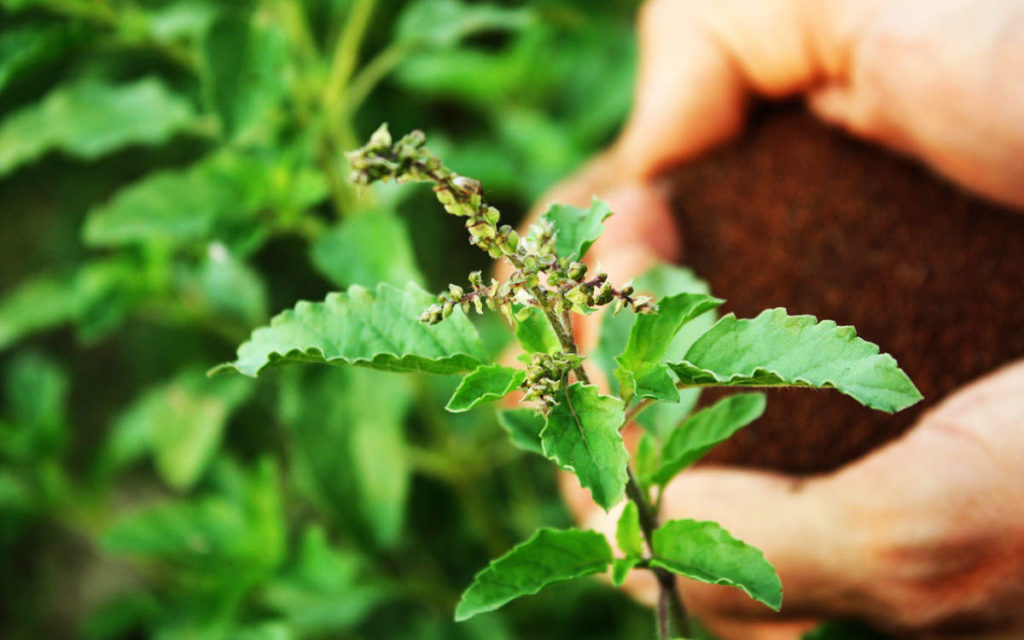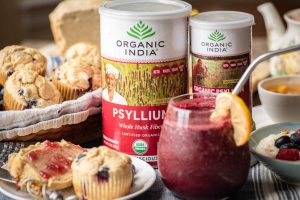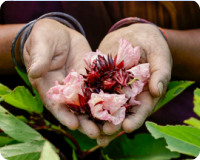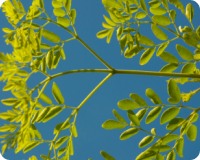

Section

Back
That morning cup of coffee that you know and love is an effective stimulant for a couple hours but oftentimes can lead to jitters, crash and dependency. That’s why more and more people are using adaptogens for energy in place of or in addition to coffee. Not only can adaptogens boost focus, productivity and endurance, they help support a healthy body and mind.
Adaptogens are natural substances found in certain herbs that help combat stress and, as the name suggests, adapt better to both internal and external changes. Adaptogenic herbs have been used for millennia by people across the globe to manage physiological, psychological and environmental stresses; thereby helping the body better conserve and utilize energy.
Contents:
Adaptogens vs. Caffeine
While adaptogens and caffeine can both help increase energy levels, they do so in quite different ways. Coffee is the most popular way to get a boost of energy, but it is most certainly not the only way. There are countless herbs with the ability to make you feel more awake and alert.
Caffeine.
Caffeine is an effective central nervous system stimulant, but it has some unwanted side effects. For one, it can temporarily increase blood pressure and cortisol levels. Cortisol is known as the “stress hormone” and works like an alarm system for the body in the face of danger. It can be to blame for that jittery, anxious feeling when caffeinated beverages like coffee are consumed in excess or on an empty stomach. Plus, caffeine can be quite addictive and regular consumption can lead to dependency.
Adaptogens.
Adaptogens, on the other hand, are shown to have a balancing effect on the hypothalamic, pituitary and adrenal gland, which are all key players in stress response. Therefore, they help the body recover from stress, support healthy cortisol levels and reduce feelings of exhaustion often caused by stress. At the same time, they have stimulant properties that improve mental and physical performance. In fact, adaptogens were developed and studied by scientists during WWII to help pilots fly longer and stronger without getting tired.
Top Adaptogens for Energy
So let’s get into the best adaptogenic herbs for energy, backed by research plus thousands of years of use in traditional systems of health. These can help you get that sustained energy that you’re looking for, without the crash. In fact, they can bring a stronger sense of wellbeing and vitality to your daily life.
1. Tulsi
Tulsi, or Holy Basil, is a powerful adaptogen that can help relax the nervous system and stimulate the brain. Hailing from India, it’s been used for thousands of years in ayurveda and is known as the “elixir of life.” Tulsi can help manage stress, improve cognitive function, allow for prolonged physical exertion, and make more efficient use of energy to help you stay awake, alert and relaxed. Further it may regulate metabolism, and ensure that carbs and sugar are used for energy rather than stored in the body.
How to use tulsi for energy.
Drink tulsi tea in the morning to harmonize your energy and make it through the day without feeling wired or exhausted. Another good use of tulsi is in the afternoon if you are feeling either jittery or sleepy; you can drink a cup of tulsi to restabilize your energy and make it through the day smoothly. You can also opt for a daily tulsi supplement in capsule form for regular sustained energy.

2. Shatavari
Also an Ayurvedic herb, shatavari is an adaptogen prized for its ability to potentially increase endurance, stamina and energy, especially in women. Being adaptogenic, it also may help manage stress response and smooth out any spikes or dips in energy. Shatavari has been used for millennia in India, and, relatively new to the west, research continues to be made with regard to its function. This invigorating herb is believed to bring clarity to the mind and stamina to the body. Though particularly good for women, it can help both men and women carry out daily tasks without burning out. Plus, it may be effective in supporting hormonal function.
How to use shatavari for energy
Take shatavari supplements daily in capsule, tablet, powder or liquid form. The best time to take it is in the morning or early afternoon. Taken consistently as part of your daily routine, the energizing and revitalizing effects of this tonic may become manifest in your everyday life.
3. Ashwagandha
Staying in the vein of powerful ayurvedic adaptogens for energy, we come to ashwagandha. This herb is one of the most important herbs for vitality in India, and has been used for more than 3,000 years for boosting energy, improving concentration and reducing stress. In fact, a study on 50 athletes shows that ashwagandha can help support physical performance, muscle strength and cardiorespiratory endurance. From then to now, it’s an excellent way to fight fatigue and keep energized.
How to use ashwagandha for energy.
It’s best to take ashwagandha with breakfast or shortly after breakfast for a natural boost of energy that is smooth and long lasting. Can be found in capsule and powder form to support vitality, strength and endurance. For powder form, it is typically mixed with warm milk or water with a low-glycemic sweetener like honey. It can also be blended into smoothies.
4. Moringa
Moringa is a tree native to northern India and hailed for its energy-boosting properties. The leaves contain vitamins, minerals and amino acids that may help bring a natural burst of energy similar to coffee, but without the caffeine. Regarded as one of earth’s best energy enhancers, this nutrient-dense superfood has adaptogenic qualities, encouraging physical and mental balance. In fact, it can help regulate stress levels and bring a sense of ease. It is known for helping you feel alert and focused without the buzz.
How to use moringa for energy.
Moringa is a green superfood available in whole leaf, teas, powders, tablets and capsules. It has an earthy flavor kind of similar to matcha. Moringa can be stirred into hot water with lemon and honey, blended into smoothies (like a mango moringa green smoothie), added to soups (like our miso moringa soup), and even baked into desserts.
5. Gotu Kola
For alertness, mood and brain function, gotu kola is your go-to Ayurvedic herb. There is debate as to whether it’s a true adaptogen, but is generally agreed to have mild adaptogenic effects. It can help increase energy levels by supporting blood flow, alleviating fatigue and supporting healthy nerve cell growth. This flowering plant is a member of the parsley family and has long been used in Traditional Chinese Medicine to support cognition and mental stamina. However, while it supports focus and vitality by day, it also may support relaxation and restful sleep by night so it’s great for encouraging an all-around rejuvenating lifestyle.
How to use gotu kola for energy.
Because this plant is similar to parsley, it serves a variety of culinary purposes to bring a healing burst to salads, curries and more. That being said, for cognitive enhancement, teas and supplements are still the preferred way to get a nurturing dose of gotu kola. Best consumed during the day with food and water.
6. Turmeric
Turmeric is an Indian spice with that characteristically yellow color known for supporting a healthy inflammatory response. While not categorically considered an adaptogen, it is considered a secondary or supporting adaptogen for its wide range of health benefits and energizing potential. Though it doesn’t provide a boost per say, it may have a stabilizing effect that can help enhance the brain’s ability to focus and function. According to research published in the American Journal of Geriatric Psychiatry, curcumin (an active ingredient in turmeric) can modulate a healthy inflammatory response in the brain, thereby helping improve memory, attention and cognition.
How to use turmeric for energy.
Turmeric is available in powders, tea infusions and capsules and has a huge range of uses. Turmeric can be sprinkled into curries, rice and other hot meals, steeped in water on its own or with other herbs, frothed into a latte (known as a golden latte), blended into smoothies or taken as a supplement for a concentrated dose.

7. Maca
Traveling across the globe to the highlands of Andes Mountains in Peru, you find Maca, also known as Peruvian Ginseng. This root packs a punch of clean energy in all areas of life. It can assist in increasing endurance, enhancing mood, improving cognitive function and balancing hormones. The nutrient-dense adaptogen has been used by the people of the Andes for millennia and today is a trendy superfood with science to back its efficacy. According to a study by the National Institutes of Health, “Experimental scientific evidence showed that maca has nutritional, energizer, and fertility-enhancer properties.” It has also been shown to improve learning and memory.
How to use maca for energy.
Maca has a pronounced flavor, described as earthy and nutty with a hint of butterscotch. The powder is popularly mixed into smoothies, yogurts or oatmeal in the morning for balanced mind-body-spirit energy. Or, it can be taken in the afternoon to beat the midday slump. Capsules and extracts are also available.
8. Cordyceps
Cordyceps are mushrooms that have long been used in Traditional Chinese Medicine. This natural energy enhancer has been found to boost ATP production, which is an organic compound that brings energy to the cells. It also can help enhance lactic acid metabolism, making exercise and other physical activities less challenging. Overall, cordyceps are found to help reduce fatigue, improve circulation and boost muscle strength, among many other functions related to immunity and respiratory health.
How to use cordyceps for energy.
Traditionally, cordyceps were consumed in soups, stews and teas for general wellness. Nowadays it is more popular to take a cordycep supplement in capsule, powder or extract form. Powders can be added to smoothies and extracts to teas and soups. Best taken in the morning or early afternoon for an energizing effect. Can be taken on an empty stomach or with food.
9. Rhodiola
Rhodiola is a hardy, adaptogenic plant that grows in the frigid highlands of Northern Asia, Eastern Europe and the Arctic. It was long used by Vikings, Sherpa people and even the ancient Greeks for strength and endurance. Today it is still a very popular supplement in Russia and its efficacy is starting to gain global attention. Data by The National Center for Complementary and Integrative Health shows that rhodiola is effective in increasing athletic performance, strength, stamina and overall energy levels. It also can help combat stress and increase mental capacity.
How to use rhodiola for energy.
Rhodiola is best taken on an empty stomach before breakfast, lunch or exercising to increase energy and enhance performance. Due to stimulatory effects, it is best not to take rhodiola at night. Typically rhodiola is taken as a supplement in herbal capsule form.
10. Ginseng
Panax ginseng is an adaptogen widely used to fight fatigue. According to a study by the Journal of Korean Medical Science, ginseng can help reduce mental fatigue, increase cognitive performance and enhance physical performance. Though the mechanism for how it does so is not conclusive, research points to its ability to help stimulate the hypothalamic-pituitary-adrenal cortex axis and potentially increase levels of “feel good” hormones like dopamine and serotonin. Ginseng has been used as a tonic in Chinese herbalism for centuries, though studies continue to be made to determine its modern day effectiveness.
How to use ginseng for energy.
Typically people consume herbal supplements made from the root of Korean panax ginseng. It can be found in powdered, capsule or extract form, though the whole roots can also be found for boiling in water to make a homemade elixir. Best taken with breakfast or lunch to increase absorption and effectiveness.
11. Schisandra Berry
Schisandra Berry is an adaptogenic berry that grows in northern China and Eastern Russia. It was actually used by the Soviet Union as a stimulant in the early 1960s and there were military studies published about its effect on physical and mental performance and resilience. In Traditional Chinese Medicine it is referred to as wu wei za and believed to bring mental alertness and stamina. According to research published in the peer-reviewed journal Nutrition, Schisandra berry may enhance physical endurance, and cognitive and behavioral functions, making it one of the best adaptogens for energy.
How to use schisandra berry for energy.
Schisandra berries are most frequently dried and used for teas and tinctures. They can also be found in extracts and powders. The powder is very versatile and can be added to juice, water and smoothies. There are also capsules available. Best taken with breakfast or lunch.

These adaptogens for energy can be taken on their own, or can often be found combined in supplements on the market. They are excellent alternatives to coffee to get lasting, sustained energy without the jitters or crash. It is always a good idea to check in with your doctor if you are chronically fatigued, and get guidance as to which of these herbs would be beneficial to add to your daily regimen. If pregnant, nursing or on medication, check with your doctor before taking herbal supplements.
Adaptogen curious? Check out these Adaptogens for Workout Endurance and Recovery, too!






